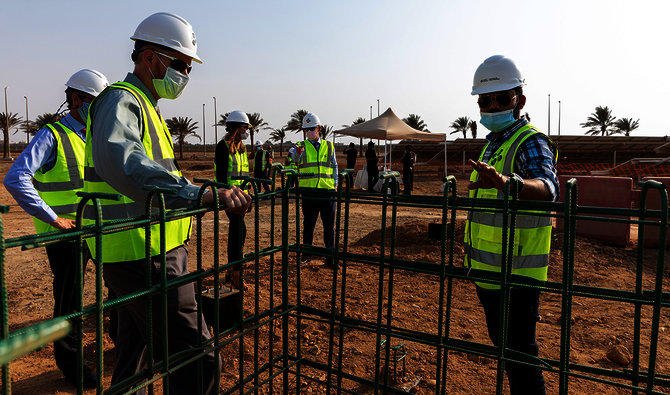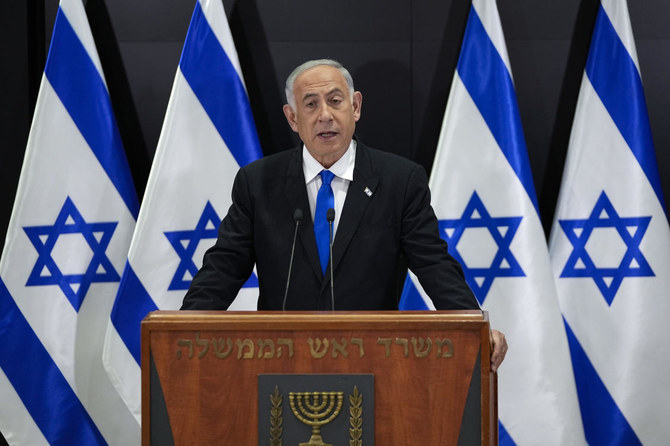JERUSALEM: Israeli Prime Minister Benjamin Netanyahu said on Monday he would leave Defense Minister Yoav Gallant in place given an escalating security crisis, reversing a decision to fire the minister that triggered protests and raised alarm abroad.
He said the two had resolved their disagreement over Gallant’s public call last month for a halt to the government’s bitterly divisive judicial overhaul plan, which Gallant said had become a threat to Israel’s security.
Last week Netanyahu announced he would delay the dismissal.
“I’ve decided to put our differences behind us,” Netanyahu said at a Monday press conference. He said the two had worked closely together throughout the last two weeks.
An Italian tourist was killed and five people were wounded in a car ramming in Tel Aviv on Friday hours after two Israeli sisters and their mother were killed in a shooting attack in the occupied West Bank.
The attacks, after a night of cross-border strikes in Gaza and Lebanon, added to heightened Israeli-Palestinian tensions following Israeli police raids in Jerusalem’s Al-Aqsa mosque this week.
The tensions threatened to widen when Israel responded to a barrage of rockets by hitting targets linked to Hamas in Gaza and southern Lebanon, but the fighting entered a lull on Friday.
A Sunday opinion poll, from Israel’s Channel 13 News, showed Netanyahu’s Likud party would lose more than a third of its seats if an election were held now, and Netanyahu would fail to gain a majority with his hard-right coalition partners.
“I’m not disturbed by the poll,” Netanyahu told reporters.
The prime minister said relations with the United States, which appeared strained over the government’s planned judicial overhaul, remained “tight” and the two countries enjoyed security and intelligence cooperation.
Netanyahu’s government paused legislation on the overhaul to allow for compromise discussions with opposition parties following weeks of nationwide protests.
Israeli PM reverses course on sacking defence minister
https://arab.news/nvseb
Israeli PM reverses course on sacking defence minister

- He said the two had resolved their disagreement over Gallant’s public call last month for a halt to the government’s bitterly divisive judicial overhaul plan
US freezes almost all aid except for Israel, Egypt arms: memo

- Secretary of State Rubio sent an internal memo days after President Trump took office vowing a policy of tightly restricting assistance overseas
- Rubio also made an exception for US contributions to emergency food assistance, such as for crises around the world including in Sudan and Syria
WASHINGTON: The United States, the world’s biggest donor, froze virtually all foreign aid on Friday, making exceptions only for emergency food, and military funding for Israel and Egypt.
Secretary of State Marco Rubio sent an internal memo days after President Donald Trump took office vowing an “America First” policy of tightly restricting assistance overseas.
“No new funds shall be obligated for new awards or extensions of existing awards until each proposed new award or extension has been reviewed and approved,” said the memo to staff seen by AFP.
The sweeping order appears to affect everything from development assistance to military aid — including to Ukraine, which received billions of dollars in weapons under Trump’s predecessor Joe Biden as it tries to repel a Russian invasion.
The directive also means a pause of at least several months of US funding for PEPFAR, the anti-HIV/AIDS initiative that buys anti-retroviral drugs to treat the disease in developing countries, largely in Africa.
Launched under president George W. Bush in 2003, PEPFAR is credited with saving some 26 million lives and until recently enjoyed broad popular support along partisan lines in Washington.
But the memo explicitly made exceptions for military assistance to Israel — whose longstanding major arms packages from the United States have expanded further since the Gaza war — and Egypt, which has received generous US defense funding since it signed a peace treaty with Israel in 1979.
Rubio also made an exception for US contributions to emergency food assistance, which the United States has been contributing following crises around the world including in Sudan and Syria.
Lawmakers from the rival Democratic Party said that more than 20 million people relied on medication through PEPFAR and 63 million people on US-funded anti-malaria efforts including nets.
“For years, Republicans in Congress have decried what they see as a lack of US credibility vis-a-vis countries like China, Russia, and Iran,” said Representative Gregory Meeks, the top Democrat on the House Foreign Relations Committee, and Representative Lois Frankel.
“Now our credibility is on the line, and it appears we will cut and run from American commitments to our partners around the world,” they wrote in a letter.
Washington has long leveraged aid as a tool of its foreign policy, saying it cares about development and drawing a contrast with China, which is primarily concerned about seeking natural resources.
Meeks and Frankel also noted that foreign assistance is appropriated by Congress and said they would seek its implementation.
The memo allows the State Department to make other case-by-case exceptions and temporarily to fund salaries to staff and other administrative expenses.
The memo called for an internal review of all foreign assistance within 85 days.
In justifying the freeze, Rubio — who as a senator was a supporter of development assistance — wrote that it was impossible for the new administration to assess whether existing foreign aid commitments “are not duplicated, are effective and are consistent with President Trump’s foreign policy.”
The United States has long been the world’s top donor in dollar terms, although a number of European nations, especially in Scandinavia, give significantly more as a percent of their economies.
The United States gave more than $64 billion in overseas development assistance in 2023, the last year for which records were available, according to the Organization for Economic Cooperation and Development, which advises industrialized countries.
Trump had already on taking office Monday signed an executive order suspending foreign assistance for 90 days, but it was not immediately clear how it would be implemented.
Anti-poverty group Oxfam said that Trump was abandoning a longstanding consensus in the United States for foreign assistance.
“Humanitarian and development assistance accounts for only around one percent of the federal budget; it saves lives, fights diseases, educates millions of children and reduces poverty,” Oxfam America president Abby Maxman said in a statement.
“Suspending and ultimately cutting many of these programs could have life or death consequences for countless children and families who are living through crisis,” she said.
UN chief urges release of staff held by Yemen’s Houthi rebels

- “The United Nations will continue to work through all possible channels to secure the safe and immediate release of those arbitrarily detained,” the secretary-general said
UNITED NATIONS, United States: UN chief Antonio Guterres called Friday for the “immediate and unconditional” release of all humanitarian staff held by Yemen’s Houthis, saying the rebel group had detained seven United Nations workers.
The Iran-backed Houthis have held dozens of workers from the United Nations and other aid groups since the middle of last year, including 13 UN staff since last June.
“Their continued arbitrary detention is unacceptable,” Guterres said in a statement, adding that the “continued targeting of UN personnel and its partners negatively impacts our ability to assist millions of people in need in Yemen.”
“The United Nations will continue to work through all possible channels to secure the safe and immediate release of those arbitrarily detained,” the secretary-general said.
Reeling from a decade of war, Yemen is mired in a humanitarian catastrophe with more than 18 million people needing assistance and protection, according to the United Nations.
The latest detentions of UN staff come after United States President Donald Trump ordered the Houthis placed back on the US list of foreign terrorist organizations.
Re-listing the Houthis will trigger a review of UN agencies and other NGOs working in Yemen that receive US funding, according to the executive order signed on Wednesday.
Large drop in number of aid trucks entering Gaza on Friday

- The influx of aid this week compares with just 2,892 aid trucks entering Gaza for the whole of December, according to data from the UN Palestinian relief agency UNRWA
UNITED NATIONS: More than 4,200 aid trucks have entered the Gaza Strip in the six days since a ceasefire began between Israel and Palestinian militants Hamas, the United Nations said, although there was a large drop in the number of loads delivered on Friday.
The UN Office for the Coordination of Humanitarian Affairs (OCHA) said 339 aid trucks crossed into Gaza on Friday, citing information from Israeli authorities and the guarantors for the ceasefire agreement — the United States, Egypt and Qatar.
This compares with 630 on Sunday, 915 on Monday, 897 on Tuesday, 808 on Wednesday, and 653 on Thursday.
The truce deal requires at least 600 truckloads of aid to enter Gaza each day of the initial six-week ceasefire, including 50 carrying fuel. Half of those trucks are supposed to go to Gaza’s north, where experts have warned famine is imminent.
When asked why there was a large drop in the number of aid trucks on Friday, OCHA spokesperson Eri Kaneko said the UN and humanitarian partners “have been working as quickly as possible to dispatch and distribute this large volume of assistance” to some 2.1 million people across the devastated enclave.
The influx of aid this week compares with just 2,892 aid trucks entering Gaza for the whole of December, according to data from the UN Palestinian relief agency UNRWA.
Aid is dropped off on the Gaza side of the border, where it is picked up by the UN and distributed. Data from OCHA shows 2,230 aid truckloads — an average of 72 a day — were then picked up in December.
Throughout the 15-month war, the UN has described its humanitarian operation as opportunistic — facing problems with Israel’s military operation, access restrictions by Israel, and more recently looting by armed gangs.
The UN has said that there has been no apparent major law-and-order issues since the ceasefire came into effect.
“We are also scaling up the broader response, including by providing protection assistance, education activities and other essential support,” Kaneko said.
Pope Francis warns of ‘fanaticism, hatred’ in social media

- The pope’s admonition comes as X, owned by Elon Musk, has been accused of spreading false information while interfering in European politics, in particular for attacking leaders including German Chancellor Olaf Scholz and British Prime Minister Keir Starm
VATICAN CITY: Pope Francis denounced an era of “disinformation and polarization” on Friday in a message for World Communications Day, as he criticized powerful social networks creating “fanaticism and even hatred.”
In saluting journalists, he spoke of their collective responsibility working “in these our times, characterised by disinformation and polarization, as a few centers of power control an unprecedented mass of data and information.”
The 88-year-old pope — who has warned in the past of the dangers of new technologies, including social media and artificial intelligence — did not cite Facebook or X by name, but his target was evident.
“Too often today, communication generates not hope, but fear and despair, prejudice and resentment, fanaticism and even hatred,” the pope wrote in his message.
“All too often it simplifies reality in order to provoke instinctive reactions; it uses words like a razor; it even uses false or artfully distorted information to send messages designed to agitate, provoke or hurt.”
FASTFACTS
• The 88-year-old pope — who has warned in the past of the dangers of new technologies, including social media and artificial intelligence — did not cite Facebook or X by name, but his target was evident.
• In a speech quoting Martin Luther King Jr., Francis said he dreamed of ‘communication that does not peddle illusions or fears, but is able to give reasons for hope.
The pope’s admonition comes as X, owned by Elon Musk, has been accused of spreading false information while interfering in European politics, in particular for attacking leaders including German Chancellor Olaf Scholz and British Prime Minister Keir Starmer.
The billionaire also used his platform and vast wealth to help propel Donald Trump to the White House.
Meta has also come under fire after its chief Mark Zuckerberg said this month that Facebook would end its third-party fact-checking program in the United States, in what critics warned would further fuel false information online.
In a speech quoting Martin Luther King Jr., Francis said he dreamed of “communication that does not peddle illusions or fears, but is able to give reasons for hope.”
He warned, however, of algorithms that feed social media users information that is specifically catered to their interests and prejudices.
Such “digital systems... by profiling us according to the logic of the market, modify our perception of reality,” he said.
“As a result, we witness, often helplessly, a sort of atomization of interests that ends up undermining the foundations of our existence as a community, our ability to join in the pursuit of the common good, to listen to one another and to understand each other’s point of view.”
Earlier this month, in his New Year’s address to Vatican diplomats, Francis lamented increasing polarization in society, “aggravated by the continuous creation and spread of fake news.”
Francis himself is a frequent target of unfounded rumors and manipulated photos online.
How Saudi Arabia is making the construction industry greener and more sustainable

- The Kingdom is advancing green construction techniques with cutting-edge technologies, local partnerships, and regulatory support
- Red Sea Global, SCG International, VEKR Environmental Services, and SABIC are setting the standard for sustainable construction
RIYADH: Saudi Arabia is embracing sustainability as a core element of its Vision 2030 economic reform agenda, driving transformative practices across whole industries.
Nowhere is this more evident than in the Kingdom’s construction sector, where innovative solutions and eco-conscious strategies are reshaping the urban landscape.
Through cutting-edge technologies, collaborative efforts and the adoption of environmentally responsible materials, companies like Red Sea Global, SCG International, VEKR Environmental Services and SABIC are setting a high standard for sustainable development.

Red Sea Global has made environmental stewardship a priority across its mega-projects, ensuring that development enhances rather than disrupts the delicate ecosystem.
“At Red Sea Global, we have initiated several critical programs to safeguard endangered species such as the hawksbill turtles and sooty falcons,” Raed Al-Basseet, RSG’s group chief environment and sustainability officer, told Arab News.
“These efforts include habitat conservation, the protection of turtles’ nesting sites, and tagging programs to monitor their behaviors. On birds, we’ve established artificial nesting sites for the sooty falcon and implemented preventive measures to mitigate bird collisions.”

The organization has also embraced advanced technologies to protect marine ecosystems.
“RSG is leveraging state-of-the-art technologies, including drone surveys equipped with multispectral cameras and satellite imagery for coral reef mapping,” Al-Basseet said.
These tools ensure the real-time monitoring of coral reefs, mangroves and seagrasses, while helping respond swiftly to environmental changes.
DID YOUKNOW?
• Saudi Arabia’s construction sector produces about 38% of the Kingdom’s carbon emissions, highlighting the critical need for sustainable practices.
• Mangroves, like those planted by RSG, can sequester up to 10 times more carbon per hectare than tropical rainforests.
• LEED Gold-certified buildings, like SABIC’s Jubail headquarters, consume 30% less energy than traditional buildings.
• 3D-printed construction reduces material waste by up to 60%, significantly lowering environmental impact.
RSG’s achievements extend beyond conservation. The company’s renewable energy initiatives have resulted in the installation of more than 760,500 solar panels, reducing CO2 emissions by 46,350 tonnes annually.
Additionally, its mangrove nursery produced more than 1 million seedlings in 2024, with a target of reaching 3 million this year.
“Our commitment to achieving a net conservation benefit of 30 percent by 2040 is integral to our vision of creating harmonious development,” Al-Basseet added.
Another key player in Saudi Arabia’s sustainability journey is SABIC, a global leader in materials innovation and environmental solutions.

SABIC’s Jubail headquarters, which has been certified with LEED Gold, stands as a symbol of green construction.
The building incorporates solar energy systems, wind turbines and electric vehicle charging stations, while also utilizing water recycling systems and low-energy lighting controls.
Beyond infrastructure, SABIC is pioneering efforts in carbon capture and utilization. The company operates the world’s largest CO2 purification and liquefaction plant, capturing 500,000 tonnes annually to convert into valuable products such as methanol and ammonia.
These initiatives reflect SABIC’s broader goal of achieving carbon neutrality by 2050, with an interim target of reducing greenhouse gas emissions by 20 percent by 2030.
Opinion
This section contains relevant reference points, placed in (Opinion field)
In addition to these efforts, SABIC has launched a circular carbon economy model, promoting renewable energy, chemical recycling and afforestation projects.
The company’s recent exports of low-carbon ammonia to global markets, including Japan and South Korea, highlight its leadership in sustainable industrial practices.
Sustainability in construction is not just about preserving nature but also about adopting technologies that redefine how buildings are constructed. SCG International, a global leader in green building solutions, is paving the way for technological innovation in the Kingdom.
“3D printing technology enables accelerated construction timelines, reducing time by up to 30 to 50 percent and labor requirements by 50 percent,” Abhijit Datta, managing director of SCG International, told Arab News.
“It significantly reduces material waste and ensures no leftover raw materials, contributing to a cleaner and safer working environment, by lowering dust and noise levels.”
Among its innovations, SCG’s concrete fabric offers a sustainable solution for erosion control and water management.
“This flexible material conforms to various shapes, reducing logistics costs and emissions while ensuring durability,” Datta said.

(Shutterstock)
The company’s commitment to local empowerment is equally noteworthy. SCG actively collaborates with Saudi firms to train teams in low-carbon cement and ready-mix consultancy services.
Despite recent progress, the adoption of sustainable construction technologies has faced difficulties.
“One of the primary challenges is the high upfront cost of sustainable building practices, which can be a concern for clients,” Dana Al-Damegh, an environmental consultant at VEKR Environmental Services, told Arab News.
“Many are not fully aware of the long-term benefits, including cost savings and enhanced efficiency, that sustainable materials can offer.”
Another pressing issue is the scarcity of resources.

“There is currently a shortage of locally sourced materials, which poses a challenge to sustainable construction efforts,” Al-Damegh said.
“This scarcity extends to skilled manpower as well, which further impacts the ability to fully leverage local resources. Addressing these gaps is crucial for achieving greater sustainability in the sector.”
Nonetheless, Al-Damegh is optimistic about the future. “The collaboration between environmental services companies and regulatory bodies has been instrumental in driving progress,” she said.
As the Kingdom advances its Vision 2030 reform agenda, the focus on green construction continues to grow. The integration of advanced technologies, development of local supply chains and investments in education as well as training will be critical to scaling sustainable practices.
“The successful implementation of sustainable methods requires collaboration, commitment and the right resources,” said Al-Damegh. “All of which are becoming increasingly accessible in Saudi Arabia’s evolving environmental landscape.”




















